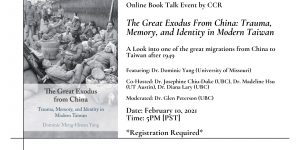
On February 10 at 5PM (PST), join the online book talk hosted by UBC’s Centre for Chinese Research. The event will feature discussions with Dr. Dominic Meng-Hsuan Yang (yangmeng@missouri.edu) on his newly published book— The Great Exodus from China: Trauma, Memory, and Identity in Modern Taiwan. We will take a look into the one of the least understood migrations in modern East Asia—the human exodus from China to Taiwan after the collapse of Chiang Kai-shek’s regime in 1949.
The talk will be moderated by Dr. Glen Peterson (glpeters@mail.ubc.ca) and also feature the panelists Dr. Josephine Chiu-Duke, UBC (Josephine.ChiuDuke@ubc.ca), Dr. Madeline Hsu, University of Texas at Austin (myhsu@austin.utexas.edu), and Dr. Diana Lary, UBC (lary@mail.ubc.ca).
Date & Time
Wednesday, February 10 | 5:00 – 6:30PM (PST)
Wednesday, February 10 | 8:00 – 9:30PM (EST)
Thursday, February 12 | 9:00 – 10:30AM (CST)
“Location”
The event will be hosted via Zoom. Participants will receive a link to access the event 24 hours prior to the event via email. Registration is required.
*If you do not receive the event link 24 hours prior to the event, please email Lisa Ren at lisaren@mail.ubc.ca
Registration Required on Eventbrite: https://bit.ly/2XtaOej
About the Book – The Great Exodus from China: Trauma, Memory, and Identity in Modern Taiwan
Dominic Meng-Hsuan Yang examines one of the least understood migrations in modern East Asia – the human exodus from China to Taiwan when Chiang Kai-shek’s regime collapsed in 1949. Peeling back layers of Cold War ideological constructs, he tells a very different story from the conventional Chinese civil war historiography that focuses on debating the reasons for Communist success and Nationalist failure. Yang lays bare the traumatic aftermath of the Chinese Communist Revolution for the hundreds of thousands of ordinary people who were forcibly displaced from their homes across the sea. Underscoring the displaced population’s trauma of living in exile and their poignant ‘homecomings’ four decades later, he presents a multi-event trajectory of repeated traumatization with recurring searches for home, belonging, and identity. This thought-provoking study challenges established notions of trauma, memory, diaspora, and reconciliation.
The book is available for orders here.
Speaker bio: Dominic Meng-Hsuan Yang (楊孟軒) is Assistant Professor of East Asian History at the University of Missouri-Columbia. He completed his PhD in the Department of History, the University of British Columbia. His research focuses on the massive human exodus out of China in the mid-twentieth century during and following the Chinese Communist victory to places like Taiwan, Hong Kong, and North America. Using this research, particularly his work on the mainlanders in Taiwan, Dominic attempts to reorient historiography of the Chinese civil war, from discussing the success and failure of two revolutionary parties to the protracted social history of mass displacement and human suffering in the war’s aftermath. On the theory front, Dominic proposes a “multiple-event” concept of trauma and memory production. The concept challenges the prevailing “single-event” notion of trauma that has originated from both the turn of the twentieth century Freudian psychoanalysis and Halbwachsian sociological memory studies. His first book “The Great Exodus from China: Trauma, Memory, and Identity in Modern Taiwan” is published by Cambridge University Press (2021). Dominic also publishes related articles inChina Perspectives, Journal of Chinese Overseas, Journal of Chinese History, Historical Reflections, and 臺灣史研究. Dominic has been a recipient of multiple SSHRC awards, Chiang Ching-kuo Foundation fellowships and young scholar grant, and Taiwan Fellowship. He has recently been awarded University of Missouri, Provost’s Outstanding Junior Faculty Research and Creative Activity Award, the highest recognition for research at the assistant level in the University of Missouri.
Please visit the Centre Website for updates and other events: